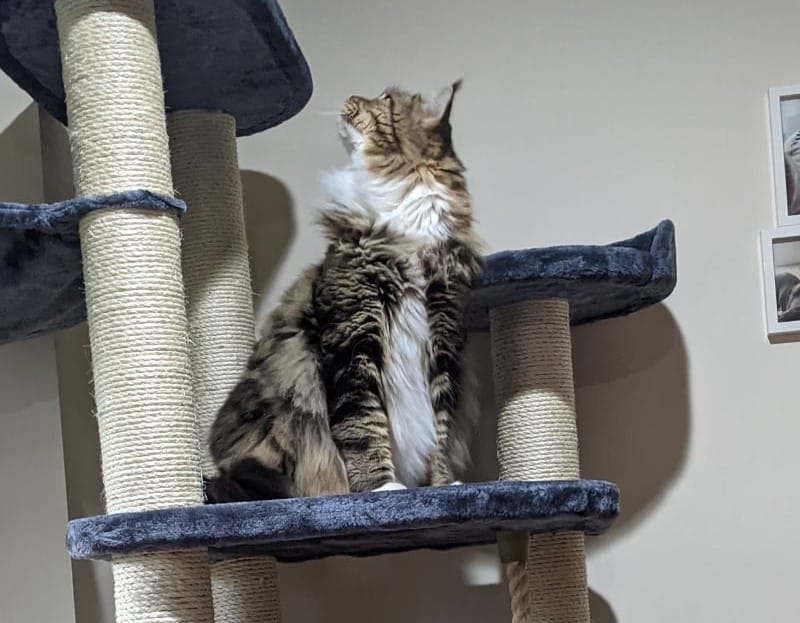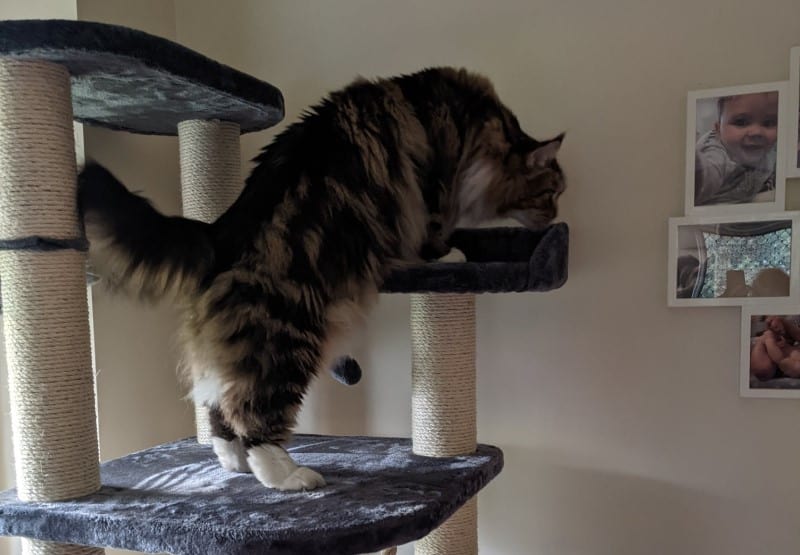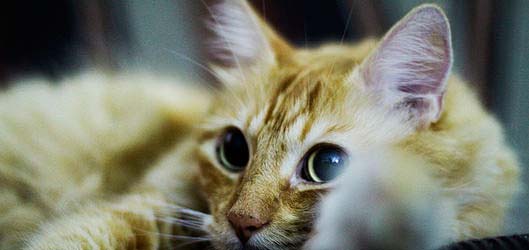Cats
Caring for Maine Coon Cats
Maine Coons are the largest domesticated cat breed. They are known for their long, shaggy coats and placid temperaments.
They are also called Coon Cat, Maine Cat, Maine Shag, American Longhair, and the Gentle Giant.
If you are thinking about adding a Maine Coon to your family, here’s what you need to know.
History
Maine Coons originated from the state of Maine in the USA around 1850. Sailors brought longhaired cats back from overseas and let them mate with local shorthaired cats. The exact origin breeds are unknown.
They named them Coon because their bushy tails resembled a racoon.
Over time, Maine Coons developed to have thicker coats to help them through freezing Maine winters.
Within 10 years, they were already very popular pets and began spreading throughout the USA. In the 1980s, the Maine Coon was imported to England. They have since become a very popular breed worldwide. They are kept as pets and entered in cat shows.

Maine Coons as Pets
Maine Coon kittens can be purchased from reputable breeders. Ask the breeder lots of questions, including asking to see the litter and home where the kittens are raised.
Prices will vary from breeder to breeder based on pedigree and demand. You may be asked to make a deposit to secure a kitten.
When it comes to choosing your Maine Coon cat, you will need to think about whether you want a male or female, whether you will be breeding your cat and whether you will be entering it in shows.
Ask about flea and heartworm control and any inoculations that the breeder has arranged to be carried out before the kitten is ready to take home.
Before you bring your kitten home, you will need to prepare. If your cat is living outdoors, you will need to build your cat enclosure. If your cat is living indoors, you will need to remove any hazards such as electrical cords.
Purchase a crate to transport your Maine Coon kitten home safely. You will also need to buy food and water bowls, food, bedding, a litter box, litter, and a scratching post.
Always try to use the same food as the breeder used to feed your Maine Coon cat. If you need to change it, then introduce the new food gradually to prevent diarrhoea.
Your breeder should be available even after you bring your kitten home to answer any queries or concerns.
Introduce your kitten to other pets slowly after it has been allowed to explore your home on its own.
Appearance & Size
Maine Coon cats are known for their size and are the largest domestic cat breed. Female Maine Coons can weigh up to 7kg and male Maine Coons can weigh as much as 11kg.
A male Maine Coon was entered into the Guinness Book of World Records in 2010 as the longest cat at 123cm.
Maine Coons are built for winter. They have long, dense fur that is ideal for surviving harsh cold climates and a bushy, long tail that is used to curl up with to keep warm. They have large paws that prevent them from sinking in the snow.
Their coat comes in various colours and patterns including tortoiseshell, solids, tabbies, parti-colours, smoke, and bi-colour.
Personality
Maine Coons are often referred to as gentle giants. Despite their daunting size, they are affectionate and friendly.
They are not a lap cat but will enjoy contact with their owners. Most will also get along with other cats or pets.
They are highly intelligent and capable hunters. Maine Coons require mental stimulation so will need toys to keep them busy.
Maine Coons are quite talkative however only make a quiet chirping sound.

Health
A Maine Coon’s life expectancy is between 12-15 years.
Responsible breeders will only breed healthy cats and try to breed out any detrimental conditions.
Maine Coons are prone to hypertrophic cardiomyopathy. This is a form of heart disease that increases the thickness of the heart wall and can lead to heart failure.
The breed is also affected by polycystic kidney disease, a condition that causes cysts to develop within the kidneys that increase in number and size as the cat ages. Symptoms include weight loss, increased urine output and thirst.
Spinal muscular atrophy can damage a Maine Coon’s spinal cord neurons, leading to muscle weakness and the ability to walk. Symptoms usually appear within the first 4 months of the kitten’s life.
Many cat breeds, including Maine Coons, are affected by feline infectious peritonitis. It is a form of coronavirus that attacks white blood cells and can lead to serious symptoms such as low blood pressure, pain, intestine obstruction, and fluid build-up. It will ultimately lead to death.
Caring for Your Maine Coon
The Maine Coon is a large breed and this will ultimately lead to them being more expensive to care for – compared to a standard sized cat they will eat more food, need larger bedding, and need a bigger enclosure.
Maine Coons love to eat and can be prone to obesity. Feed your cat a high quality and balanced diet with limited treats. Also encourage physical activity, such as climbing scratching posts or playing with toys.
Maine Coons have a long coat that is prone to tangles and shedding. It is recommended you brush their fur at least once per week.
This will help minimise the amount of cat hair on your clothes and furniture! If you begin this routine from an early age, your cat may learn to enjoy the attention grooming brings and it can help you to bond.
Cat Enclosures
A cat enclosure allows your cat time outside without being able to wander too far. This gives you peace of mind and minimises the risk of your cat being lost, stolen, or injured. It also protects native wildlife from your hungry kitty.
Maine Coons are a large breed so require a large enclosure. They need plenty of room to jump, play and stretch out without feeling trapped.
Before purchasing a cat enclosure online, get out a tape measure and check the dimensions to make sure it is big enough for your feline friend.
Both the Stacey and Greta cat enclosures feature a large outdoor run section with shelves for your cat to jump up onto. With playing and resting areas, your fur baby is sure to love their new outdoor house.
If you are just after a run for a few hours of outdoor play time, the Large Cat Run is a great choice for Maine Coons.




It is conceivable that the predecessors of the Maine Coon kittens were brought by the Vikings. It is really perceived that they were going with felines. As indicated by the Sagas, Leif Ericson had colonized the fanciful Vinland around the year Mil. These programs have presumably settled in the “Anse aux Jellyfish (Meadows), in Newfoundland, where archeologists have discovered hints of a Scandinavian town. For more such facts visit the site.